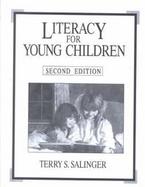Literacy for Young Children
- List Price: $80.40
- Binding: Paperback
- Edition: 2ND
- Publisher: Pearson
- Publish date: 08/01/1995
Description:
1. Understanding and Applying Research on Literacy Development. Two Theories. Two Instructional Approaches. Two Processes: Which Comes First. Different Views of Children's Learning: Current Research. Kidwatching. Important Findings. Instructional Implications: Emergent Literacy. New Terms. Summary. Questions and Tasks for Independent or Collaborative Work. 2. Classrooms for Literary Growth. Teachers as KidWatchers, Decision Makers, and Researchers. Literacy Workshops. Physical Concerns for a Workshop Approach. Interpersonal Components. Getting Started With A Literacy Workshop Approach. Planning Students Activities. Activities for the Literacy Workshop. Integrated Curriculum in Emergent Literacy Classrooms. Summary. Questions and Tasks for Independent or Collaborative Work. 3. Assessment of Literacy. The Debate About Assessment. Classroom-Based Assessment. Finding Time for Assessment. Observating, Interviewing, and Conferencing, With Students. Running Records and Story Retellings. Creating Student Portfolios. The South Brunswick Literacy Portfolio. Grading in A Classroom-Based Assessment Approach. Summary. Questions and Tasks for Independent or Collaborative Work. 4. Fostering the Home-School Connection. Building Home-School Links. Building the Home-School Connection. Initial Communication with Parents. Welcoming Parents and Caregivers. Offering Explanations. Finding the Right Level: Support, Involvement, and Participation. Communicating With the Home. Homework. Reading and Writing with Children. Reporting on Progress. Summary. Questions and Tasks for Independent and Collaborative Work. 5. Culturally-Sensitive Instruction. The Demographic Imperative. Linguistic Factors. Cultural Factors. Social Factors. Responding to Diversity with Sensitivity and Celebration. First Core Component: Respect. Second Core Component: Awareness of Language. Summary. Questions and Tasks for Independent or Collaborative Work. 6. Making Progress with Communication Skills. A Brief Discussion of Language Acquisition. Playing with Language. Thinking about Language. Learning About Concepts. Encouraging Language Growth. Learning English as a Second Language. Pragmatics. Contextualized and Decontextualized Language. Learning the Language of School. Instructional Activities for Listening and Speaking. Rhymes, Poems, Jingles and Finger Plays. Conversations and Discussions. Experiences with Books and Other Graphic Stimuli. Directed Listening-Thinking Activity. Movement Activities, Dramatics, and Improvisation. Instructional Implications: Grammar and Sentence Structure. Appropriate Strategies. Summary. Questions and Tasks for Independent or Collaborative Work.. 7. Awareness of Print. What Children Learn About Print Production. Principles of Print Production. Practice Leads to Fluency. Children's Concepts of Words. Invented Spelling. What Children Learn About Reading. Learning about Talking and Thinking about Literacy. Summary. Questions and Tasks for Independent or Collaborative Work. 8. The Beginnings of Literacy (Preschool and Kindergarten). Helping Children Refine their Emerging Literacy Skills. Share Literacy Experiences. Storybook Reading. Big Books. Language Experience Approach. Guidelines for Preschool and Kindergarten LEA. Writing in Preschool and Kindergarten Classes. Drawing and Writing. Keeping a Journal. Writing to Communicate. The Social Nature of Writing. And Since We're Thinking about Spelling. What Can Teachers Expect. Progression Beyond Labels and Captions. Palying with Ideas and Conventions. Summary. Questions and Tasks for Independent or Collaborative Work. 9. Moving Toward Literacy. Expanding the Model of Emergent Literacy Instruction. Effective Instruction. Assessi
Expand description
Product notice
Returnable at the third party seller's discretion and may come without consumable supplements like access codes, CD's, or workbooks.
| Seller | Condition | Comments | Price |
|
BookReadingInc
|
Acceptable
|
$17.92
|
|
BookReadingInc
|
Good
|
$19.31
|
|
HPB-Red
|
Good
|
$5.62
|
|
Ergodebooks
|
Good |
$6.87
|
|
readmybooks
|
Acceptable |
$17.75
|
|
readmybooks
|
Good |
$19.12
|
|
A2ZBooks
|
New
|
$44.72
|

Please Wait

